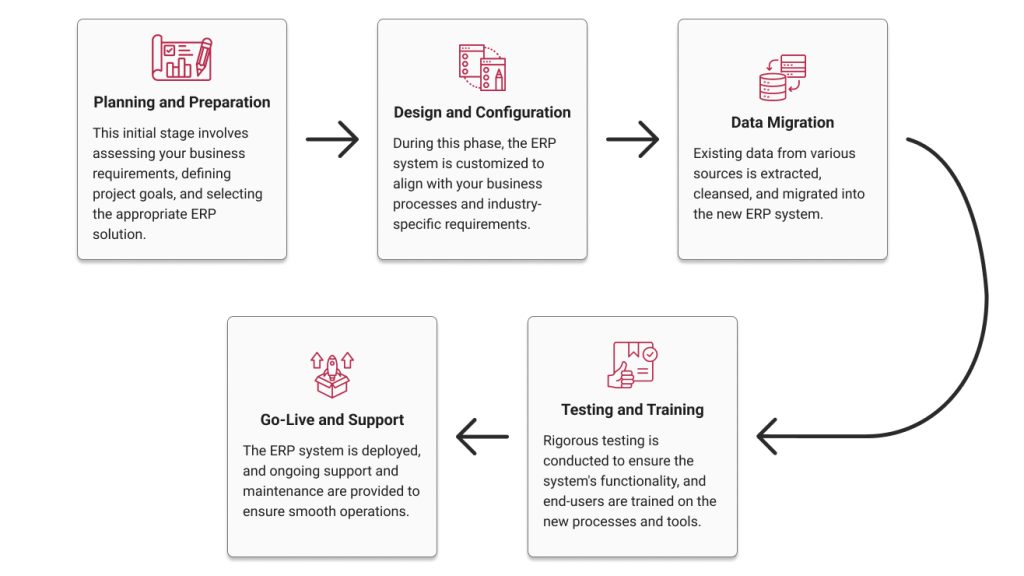
Posted On Nov 14 2024 | 16:26
Implementing an Enterprise Resource Planning (ERP) system is a complex and critical undertaking for any business. It involves integrating various business processes, data, and applications into a unified system, streamlining operations, and improving overall efficiency. However, a successful ERP implementation requires careful planning, execution, and a deep understanding of the process. In this article, we will explore the five essential steps for a seamless ERP implementation, providing insights and best practices to help you navigate this transformative journey.

The first step in the ERP implementation journey is selecting the right ERP solution that aligns with your business needs, industry requirements, and growth aspirations. Conduct a thorough assessment of your current processes, pain points, and future goals. Evaluate various ERP solutions based on their functionality, scalability, integration capabilities, and vendor support.
Remember, an ERP system is a long-term investment, and choosing the right solution can significantly impact your business’s success. Consider factors such as industry-specific features, cloud or on-premises deployment, and the vendor’s reputation and financial stability.
Once you have selected the appropriate ERP solution, it’s time to consider engaging with an experienced ERP implementation partner. In the United States, numerous reputable ERP implementation services are available, offering expertise, best practices, and proven methodologies.
These service providers can guide you through the entire implementation process, from planning and design to data migration and user training. They bring industry-specific knowledge and have successfully implemented ERP systems for businesses across various sectors.
By partnering with a trusted ERP implementation service provider, you can leverage their experience, mitigate risks, and ensure a smoother transition to the new system.
3. ERP Solutions for Businesses in India
For businesses operating in India, there is a growing demand for ERP solutions tailored to the unique challenges and regulatory requirements of the Indian market. Several ERP vendors and implementation partners offer specialized solutions designed to meet the needs of Indian businesses.
These solutions often include localized features, such as support for regional languages, tax compliance, and integration with government portals. Additionally, they may offer industry-specific modules catering to sectors like manufacturing, retail, and healthcare.
By choosing an ERP solution specifically designed for the Indian market, businesses can ensure compliance, streamline operations, and gain a competitive advantage in their respective industries.
4. The ERP Planning Process
Effective planning is the foundation of a successful ERP implementation. During this stage, it’s essential to establish a dedicated project team, define clear goals and objectives, and develop a comprehensive project plan.
The planning process should involve stakeholders from various departments, including finance, operations, IT, and end-users. This collaborative approach ensures that the ERP system meets the needs of all business units and facilitates a smooth transition.
Key elements of the ERP planning process include:
- Project Scope and Timeline: Define the scope of the implementation, including the modules to be implemented, and establish a realistic timeline with milestones and deliverables.
- Resource Allocation: Identify and allocate the necessary resources, including project team members, subject matter experts, and budgetary requirements.
- Change Management: Develop a change management strategy to address potential resistance and ensure user adoption.
- Risk Assessment: Identify and mitigate potential risks that could impact the implementation process.
- Data Quality Issues: Inaccurate or incomplete data can undermine the effectiveness of the ERP system. Address data quality concerns by implementing robust data cleansing and migration processes.
- User Resistance: Change can be difficult, and some employees may resist adopting the new system. Effective change management, communication, and training can help overcome this resistance.
- Integration Complexities: Integrating the ERP system with existing applications and systems can be a daunting task. Carefully plan and test integrations to ensure seamless data flow.
- Budget Overruns: ERP implementations can be costly, and unexpected expenses can strain budgets. Develop a detailed budget and contingency plan to mitigate financial risks.
- Choose the right ERP solution that aligns with your business needs and growth aspirations.
- Partner with experienced ERP implementation services in the US or specialized ERP solutions for businesses in India.
- Engage in comprehensive planning, involving stakeholders from various departments and addressing potential risks.
- Develop a robust change management strategy to ensure user adoption and overcome resistance.
- Proactively address common challenges, such as data quality issues, integration complexities, and budget overruns.
